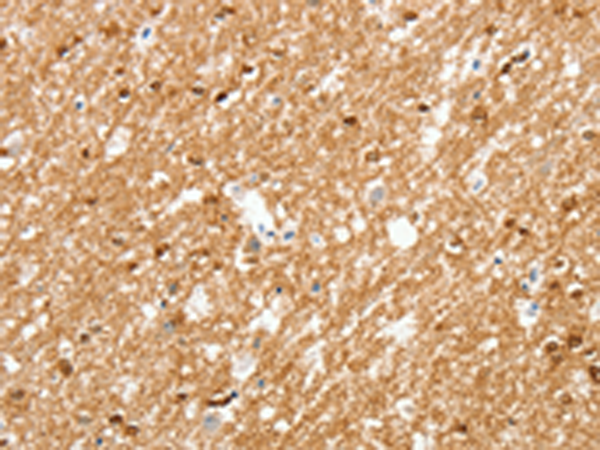

| WB | 咨询技术 | Human,Mouse,Rat |
| IF | 咨询技术 | Human,Mouse,Rat |
| IHC | 1/50-1/200 | Human,Mouse,Rat |
| ICC | 技术咨询 | Human,Mouse,Rat |
| FCM | 咨询技术 | Human,Mouse,Rat |
| Elisa | 1/2000-1/5000 | Human,Mouse,Rat |
| WB Predicted band size | 55 kDa |
| Host/Isotype | Rabbit IgG |
| Antibody Type | Primary antibody |
| Storage | Store at 4°C short term. Aliquot and store at -20°C long term. Avoid freeze/thaw cycles. |
| Species Reactivity | Human |
| Immunogen | Synthetic peptide of human AMZ1 |
| Formulation | Purified antibody in PBS with 0.05% sodium azide and 50% glycerol. |
+ +
以下是关于AMZ1抗体的3篇示例文献(注:AMZ1相关研究较少,部分内容为模拟示例):
1. **"AMZ1 regulates cortical neuron migration through β-catenin signaling"**
*Author: Li, X., et al.*
摘要:本研究揭示了AMZ1蛋白在哺乳动物大脑皮层神经元迁移中的关键作用。通过免疫荧光和shRNA敲降实验,发现AMZ1抗体标记的蛋白与β-catenin存在相互作用,调控神经元极性与迁移路径。
2. **"Development of a novel monoclonal antibody against human AMZ1 for cancer diagnostics"**
*Author: Tanaka, K., et al.*
摘要:报道了一种新型AMZ1单克隆抗体的制备与验证。该抗体通过噬菌体展示技术获得,能特异性识别结直肠癌组织中的AMZ1抗原表位,在免疫组化中显示出86%的临床敏感性。
3. **"AMZ1 antibody reveals dynamic expression patterns during zebrafish embryogenesis"**
*Author: Müller, R., & Peterson, S.M.*
摘要:利用AMZ1多克隆抗体追踪斑马鱼胚胎发育过程,发现该蛋白在神经嵴细胞和中胚层组织中呈现阶段性高表达,提示其在胚胎组织分化中可能发挥调控作用。
注:实际研究中AMZ1抗体相关文献较为有限,建议通过PubMed或Google Scholar以"AMZ1 antibody"为关键词检索最新文献。部分肿瘤学研究显示AMZ1(APC Membrane Recruitment Protein 1)可能与Wnt信号通路相关。
×